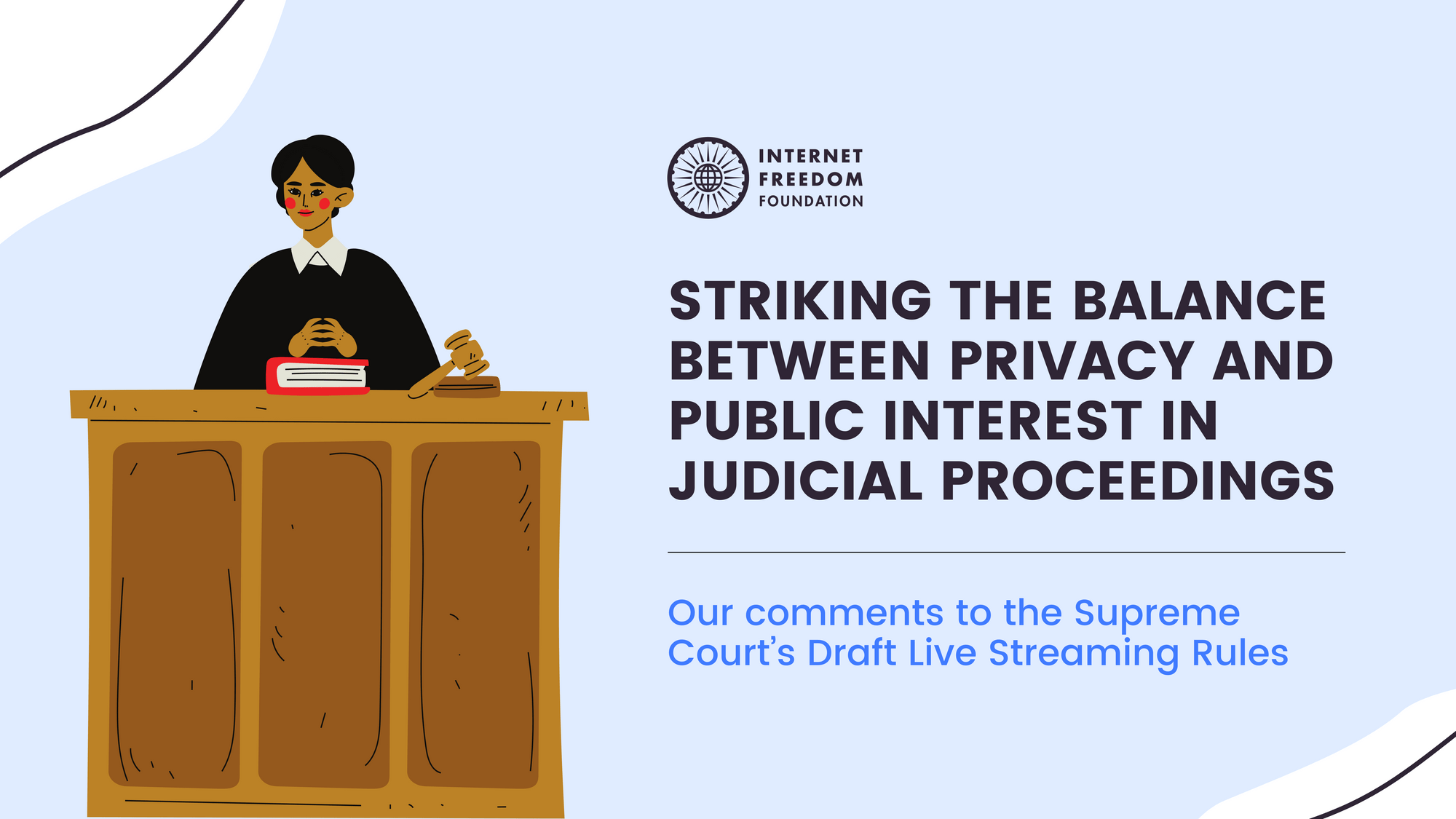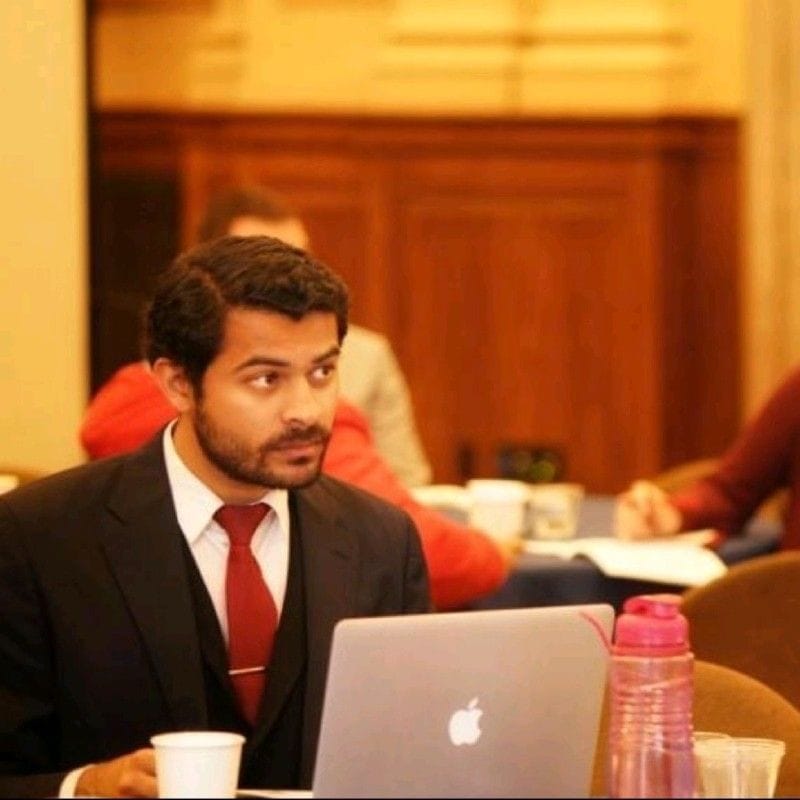
tl;dr
Draft Model Rules for Live-Streaming and Recording of Court Proceedings were released by the Supreme Court’s e-Committee. The Draft Rules make provision for a vital public service, i.e. live streaming of court proceedings, and invited comments from the public by June 30, 2021. IFF submitted its comments to the Draft Rules welcoming the Rules and expressed its strong support for their implementation. However, at the same time, we suggested that the Rules in their final form can strike a better balance between litigant/witness privacy and the public interest in disclosure.
Background
The Supreme Court’s e-Committee released Draft Model Rules for Live-Streaming and Recording of Court Proceedings on May 28, 2021 (the Draft Rules) and sought public comments on the draft until June 30, 2021. This is a huge step for transparency in the judicial process, and will bring much greater accessibility regarding the higher judiciary for the ordinary public. This has been made possible by the advocacy of Ms. Indira Jaisingh and her team, particularly in the matter of Swapnil Tripathi v. Supreme Court of India and others.
In that petition, it was argued that the right to seek and receive information including live streaming of proceedings from the Supreme Court is a fundamental right guaranteed under Article 19(1)(a) of the Constitution; the move will strengthen public confidence in the Judiciary by furthering transparency and the principle of Open Justice; and that recording and live streaming the proceedings of cases of public importance would completely negate the chances of any misreporting
These arguments were accepted by the Supreme Court, which held that open trials and access to the public during hearing of cases before the Court is an accepted proposition, and that live streaming of Court proceedings can allow the public to witness live court proceedings.
In our previous blogpost, we laid out the provisions of the Draft Rules and analysed what kind of cases and court events will be available for streaming and recording, and what will not. We noted that any such move must properly achieve the balance between privacy and the public interest.
Our Recommendations
In our opinion, small amendments are still required to improve the balance between privacy and public interest, though we are cognisant that the Draft Rules have made a clear and mindful attempt to strike such a balance. The comments we have offered to the Draft Rules make an attempt to improve this balance through minor tweaks. We offered the following recommendations:
- Remove ambiguity in Rule 3.2: Rule 3.2 of the Draft Rules requires the Dedicated Control Room (DCR) to ensure that nothing “uncivil or inappropriate” is streamed in the public, but no clarity has been provided as to what constitutes “uncivil” or “inappropriate”. In such cases, it is presently left to the discretion of technical experts to decide what is uncivil and inappropriate. We recommended that the Draft Document must remove this ambiguity and lay down clearer guidelines and standards for ‘civil’ and ‘appropriate’ content.
- Tighter protections for victims/witnesses: Rule 5.8 of the Draft Rules provides for the maintenance of anonymity of the recorded testimony of victims/witnesses in criminal cases, by using dummy names, voice distortion, pixelation and face masking. In cases where anonymity of victims and witnesses cannot be maintained in the recordings via these technological solutions, for reasons of technical glitches or logistical failures, there is no guidance on how the control room is to proceed. We recommended that it should be clarified that the proceedings are adjourned until such issues are resolved.
- No provision to secure personal data: Since the recordings concern legal proceedings of individual litigants, including criminal proceedings, they are likely to contain sensitive personal data. In fact, even the participation of an individual in a criminal trial may in itself be sensitive information. While the Draft Rules include detailed provisions for what sort of information has to be screened from streaming publicly, they are less clear on what sort of information can be screened from recording at all, since Rule 5.7 requires recordings to be maintained for all cases, even when such recordings are not being live-streamed. Since all recordings are also required to be saved for at least six months under Rule 7.4, we sought clarity on how this data will be secured. This is of particular concern since India does not have a data protection regime.
- Greater protection for personal information is required: Rule 8.1 of the Draft Rules provides for general precautions in relation to personal data, and suggests that “any one of the masking techniques, as provided under Rule 6.8, may be adopted”. However, there is no Rule 6.8 in the Draft Rules (the sub-parts of Rule 6 are Rules 6.1-6.5). We requested that in the event this is a typographical error, and Rule 8.1 intended to refer to the masking techniques in Rule 5.8, clarity be provided in Rule 8.1 as well regarding the situations where such masking techniques are unavailable for technical or logistical reasons, to prevent the control room from proceeding without the masking techniques.
- 10 minute delay in streaming: Similarly, the requirement for there to be a ten-minute delay in streaming under Rule 8.3.i. also does not provide any standards or objectives sought to be achieved by such delay. The delay may well serve the legitimate purpose of ensuring that no inappropriate content is streamed, but without clear guidelines on how the time is to be used, such a provision is open to misuse.
Since the proposals in the Draft Rules also apply to all district and sessions courts in rural India, we noted that special care is required during the implementation stage to upgrade and upkeep the electronic infrastructure and personnel at such courts. A team of technical experts and an extensive recruitment and training exercise will be required for every court. We expressed our belief that the success of the proposal to enable live-streaming of judicial proceedings depends on the successful implementation of the hardware and personnel aspects of the Draft Document, and expressed our confidence that the e-Committee will be able to successfully implement the Draft Document in this manner.
Please give your comments!
This is the second such document that the e-Committee has released in the past couple of months. In April 2021, the e-Committee released the Draft Vision document for Phase III of eCourts Project. We submitted our comments to that document with the e-Committee. We have now also submitted our comments to the e-Committee regarding the new Draft Live-Streaming Rules.
We believe that in a democracy, it is the civic duty of each and every individual to strengthen our democracy by encouraging and participating in consultative processes. We encourage you to share your comments to the Draft Live-Streaming Rules with us on our forum and tell us what you think, and also to independently offer your comments and suggestions to the e-Committee via email at [email protected].
Important Documents
- IFF’s comments to the Draft Model Rules for Live-Streaming and Recording of Court Proceedings (link)
- Copy of the Draft Model Rules for Live-Streaming and Recording of Court Proceedings (link)
- Previous blog post dated 18 June, 2021 titled “Live and let Live: The Supreme Court releases draft rules for live streaming of court proceedings” (link)

